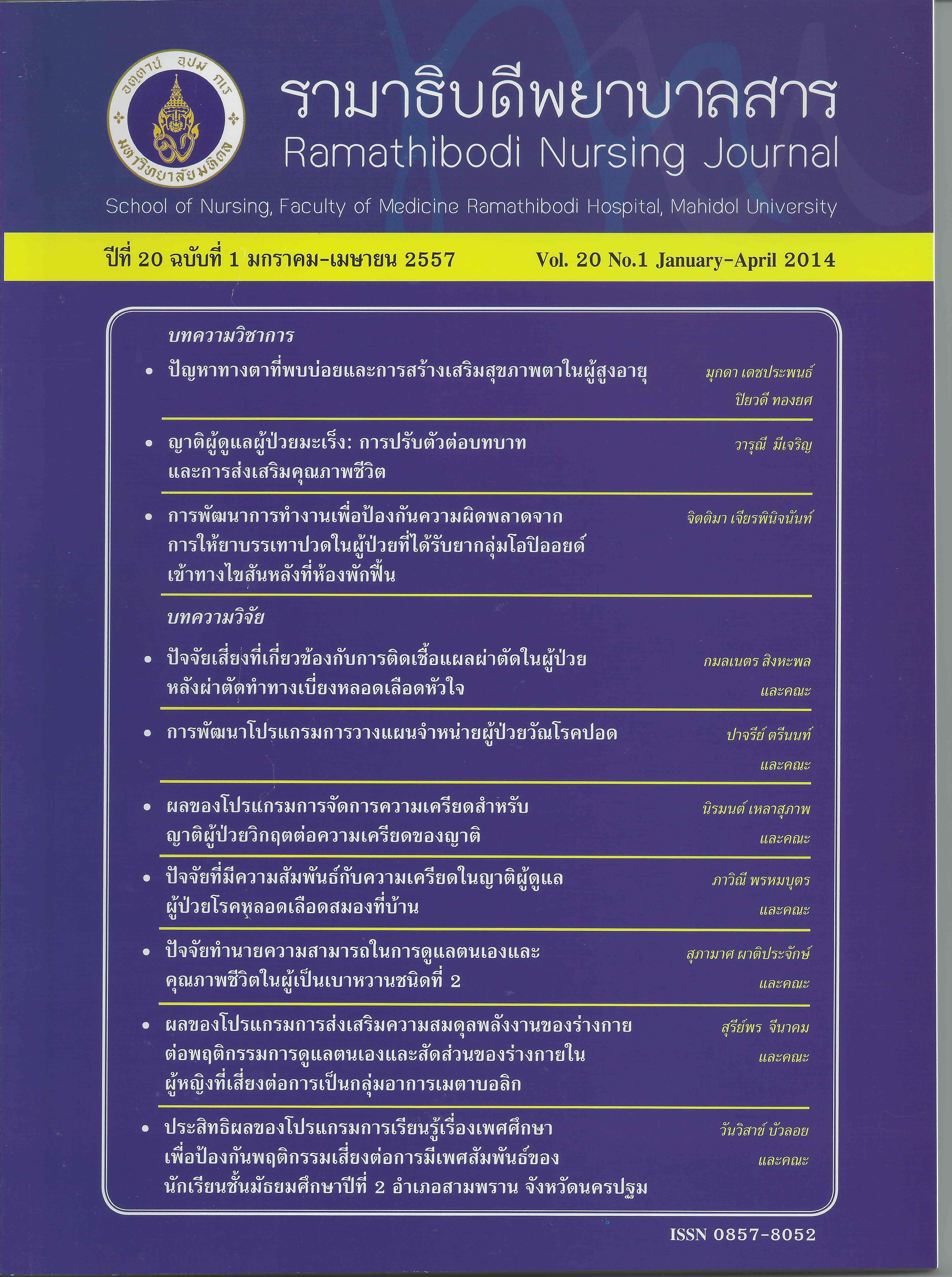ผลของโปรแกรมการจัดการความเครียดสำหรับญาติผู้ป่วยวิกฤตต่อความเครียดของญาติ
Main Article Content
Abstract
บทคัดย่อ:
การศึกษาครั้งนี้เป็นการวิจัยกึ่งทดลอง (quasi-experimental research) ชนิดหนึ่งกลุ่มวัดก่อนและหลังการทดลอง (one group pretest-posttest design) เพื่อศึกษาผลของโปรแกรมการจัดการความเครียดสำหรับญาติผู้ป่วยวิกฤตต่อการลดความเครียดของญาติผู้ป่วยวิกฤต โดยใช้ทฤษฎีภาวะวิกฤตของอกิลเลร่า (1998) เป็นกรอบแนวคิดในการวิจัย โดยเลือกกลุ่มตัวอย่างแบบเฉพาะเจาะจง กลุ่มตัวอย่างเป็นญาติของผู้ป่วยที่เข้ารับการรักษา ณ หออภิบาลผู้ป่วยวิกฤตศัลยกรรม โรงพยาบาลระดับตติยภูมิ ตั้งแต่เดือนกรกฎาคม ถึงเดือนพฤศจิกายน พ.ศ. 2554 จำนวน 30 ราย กลุ่มตัวอย่างได้รับการพยาบาลตามโปรแกรมการจัดการความเครียดสำหรับญาติผู้ป่วยวิกฤต พร้อมกับคู่มือการจัดการความเครียดสำหรับญาติผู้ป่วยวิกฤตที่ผู้วิจัยพัฒนาขึ้น เครื่องมือในการเก็บรวบรวมข้อมูลคือ แบบบันทึกข้อมูลส่วนบุคคล และแบบวัดความเครียดของญาติผู้ป่วยวิกฤตวิเคราะห์ข้อมูลโดยใช้สถิติบรรยาย สถิติทดสอบที และการทดสอบวิลคอกซอน ผลการศึกษาพบว่า
กลุ่มตัวอย่างมีคะแนนความเครียดหลังได้รับโปรแกรมลดลงกว่าก่อนได้รับโปรแกรมอย่างมีนัยสำคัญทางสถิติ ผลการศึกษาครั้งนี้สามารถนำไปใช้เป็นแนวทางในการพัฒนาคุณภาพการพยาบาลเพื่อตอบสนองความต้องการและช่วยเหลือญาติผู้ป่วยวิกฤตในการจัดการความเครียดอย่างมีประสิทธิภาพ
คำสำคัญ: การจัดการความเครียด ความเครียด ญาติผู้ป่วยวิกฤต หอผู้ป่วยวิกฤต
Abstract:
The present study was quasi-experimental research with a one-group pretest-posttest design that aimed at investigating the effect of a stress management program for relatives of critically ill patients on relatives’ stress. The crisis theory of
Aguilera (1998) was employed as the conceptual framework of the study. The sample was selected by means of purposive sampling. They were 30 relatives of critically ill patients who were admitted into the surgical intensive care unit of a tertiary hospital from July to November 2011. The subjects received the stress management program and a manual for stress management for relatives of critically patients developed by
the researchers. The instruments used in data collection consisted of a demographic characteristics questionnaire and the stress of relatives of critically ill patent questionnaire.
Data were analyzed by means of descriptive statistics, t-test, and Wilcoxon Signed-Rank test. The study findings revealed that the subjects’ mean score of stress obtained after participation in the program was lower than that obtained before participation in the program with statistical significance. The findings of this study could be used as a guideline to develop nursing care quality to respond to needs of relatives of critically ill patients to help them cope with stress effectively.
Keywords: Stress management, Stress, Relatives of critically ill patients, Intensive care unit
Article Details
บทความ ข้อมูล เนื้อหา รูปภาพ ฯลฯ ที่ได้รับการตีพิมพ์ในรามาธิบดีพยาบาลสาร ถือเป็นลิขสิทธิ์ของวารสาร หากบุคคลหรือหน่วยงานใดต้องการนำทั้งหมดหรือส่วนหนึ่งส่วนใดไปเผยแพร่หรือเพื่อกระทำการใด ใด จะต้องได้รับอนุญาตเป็นลายลักษณ์อักษรจากรามาธิบดีพยาบาลสารก่อนเท่านั้น


